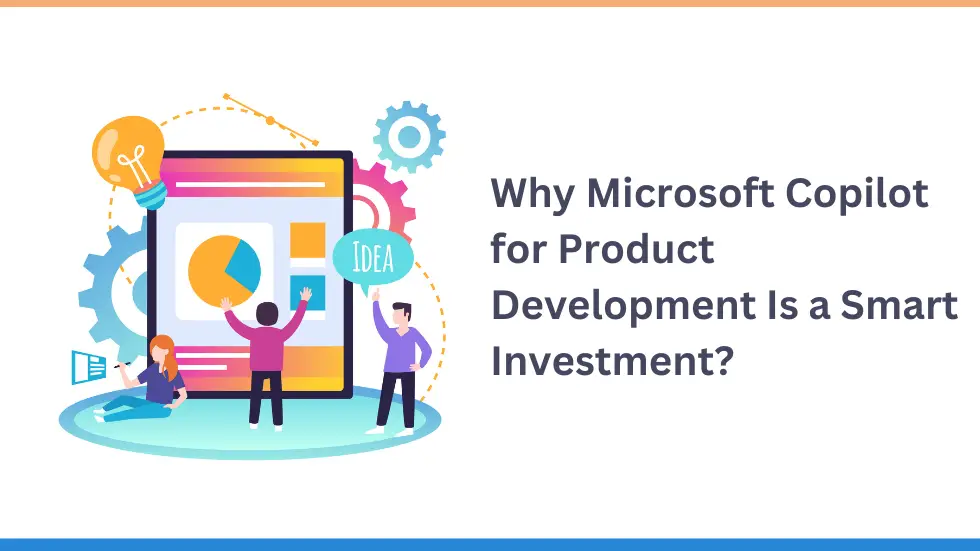For product development companies working with the Microsoft technology stack, Artificial Intelligence (AI) is no longer just a buzzword—it’s reshaping how software is designed and delivered.
Among the many AI-powered tools available today, Microsoft Copilot for Product Development stands out as a game-changer.
Unlike generic AI assistants, Copilot is deeply embedded into Microsoft’s development ecosystem, offering developers smarter suggestions, seamless integration, and productivity gains.
For enterprises and startups looking to accelerate product delivery while improving code quality, adopting Microsoft Copilot is more than just hype—it’s a smart business move.
1. Seamless Integration Across Microsoft Development Tools
One of the greatest strengths of Microsoft Copilot for Product Development is its native integration with Microsoft tools.
- Visual Studio & VS Code: Copilot sits inside the IDEs developers already use, delivering real-time code suggestions, smart completions, and reusable snippets. No context-switching, just faster coding.
- GitHub Integration: With insights from millions of repositories, Copilot helps draft commit messages, recommend fixes, and suggest best practices—enhancing collaboration and code reviews.
- Power Platform Support: Beyond professional developers, Copilot also assists low-code creators in Power Apps and Power Automate, bridging business and technical teams.
This seamless integration ensures developers stay focused on building, not juggling multiple tools.
2. Contextual Intelligence Beyond Autocomplete
Copilot is more than just a coding assistant—it understands the intent behind your work.
- Semantic Awareness: By analyzing project structure, variable names, and comments, Copilot generates context-aware suggestions.
- Tailored for Microsoft Stack: Whether working with .NET, C#, ASP.NET Core, or Azure SDK, Copilot delivers recommendations aligned with Microsoft’s coding standards.
- Pattern Recognition: By learning from recurring patterns, Copilot anticipates the next logical steps in your code, saving time on repetitive tasks.
This contextual intelligence transforms Copilot from a simple autocomplete tool into a true AI collaborator.
3. Accelerating Product Delivery with Microsoft Copilot
In today’s competitive market, time-to-market is everything. Microsoft Copilot helps development teams deliver faster and smarter:
- Rapid Code Generation: From small snippets to entire functions, Copilot reduces manual effort.
- Error Reduction: Suggestions minimize common bugs, reducing debugging time.
- Faster Learning: Developers exploring Azure Cosmos DB, Blazor, or other Microsoft technologies can rely on Copilot as a real-time mentor.
- Strategic Focus: With repetitive tasks automated, teams can focus on architecture, business logic, and innovation.
For enterprises, this translates to faster cycles, more features, and a strong competitive edge.
4. Driving Innovation with Microsoft Copilot for Product Development
Beyond efficiency, Copilot sparks innovation and creativity:
- Alternative Solutions: Developers discover new approaches they may not have considered.
- Rapid Prototyping: Teams can test new features quickly by generating functional prototypes.
- Breaking Down Complexity: For challenging problems, Copilot offers structured starting points.
By acting as both a productivity tool and an innovation partner, Microsoft Copilot enables teams to push boundaries in product development.
5. ROI and Business Impact of Microsoft Copilot
Adopting Microsoft Copilot for Product Development is not just a technical upgrade—it’s a strategic business decision:
- Increased Throughput: Deliver more features with the same team size.
- Reduced Costs: Shorter cycles and fewer bugs lower development expenses.
- Better Code Quality: Clean, maintainable code leads to long-term savings.
- Faster Time-to-Market: Companies gain a competitive advantage by launching products and features sooner.
For startups, enterprises, and seed-funded companies, the ROI is clear: more productivity, stronger innovation, and lower costs.
6. A Future-Proof AI Partner
Microsoft continues to evolve Copilot with smarter AI models and deeper integrations. This ensures that Microsoft Copilot for Product Development will only become more intelligent and relevant over time, keeping development teams future-ready.
Key Considerations for Adoption
Before rolling out Copilot, companies should:
- Train teams on best practices for AI-assisted coding.
- Maintain strict code review and security standards.
- Use Copilot as a partner, not a replacement for developer expertise.
- Ensure compliance with privacy and industry regulations.
Conclusion
For organizations rooted in the Microsoft ecosystem, Microsoft Copilot for Product Development is more than a passing AI trend—it’s a strategic advantage.
With seamless integration, contextual intelligence, and proven ROI, Copilot empowers teams to deliver faster, innovate more, and scale smarter.
By adopting Copilot thoughtfully, enterprises and startups can future-proof their product development journey and stay competitive in today’s evolving software landscape.
Additional Resources:
